- Home
- Lisa Kleypas
Secrets of a Summer Night Page 3
Secrets of a Summer Night Read online
Page 3
On the few occasions they had met since that day at the panorama, Annabelle had treated Simon Hunt coldly, dismissing any attempts at conversation and refusing his every invitation to dance. He always seemed amused by her disdain and stared at her with a bold appraisal that made the hairs on the back of her neck rise. She hoped that someday he would abandon all interest in her, but for the time being he remained annoyingly persistent.
Annabelle sensed the other wallflowers’ relief as Hunt ignored them and turned his attention exclusively to her. “Miss Peyton,” he said. His obsidian gaze seemed to miss nothing; the carefully mended sleeves of her gown, the fact that she had used a spray of pink rosebuds to conceal the frayed edge of her bodice, the paste pearls dangling from her ears. Annabelle faced him with an expression of cool defiance. The air between them seemed charged with a sense of push-and-pull, of elemental challenge, and Annabelle felt her nerves jangle unpleasantly at his nearness.
“Good evening, Mr. Hunt.”
“Will you favor me with a dance?” he asked without prelude.
“No, thank you.”
“Why not?”
“My feet are tired.”
One of his dark brows arched. “From doing what? You’ve been sitting here all evening.”
Annabelle held his gaze without blinking. “I have no obligation to explain myself to you, Mr. Hunt.”
“One waltz shouldn’t be too much for you to manage.”
Despite Annabelle’s efforts to stay calm, she felt a scowl tugging at the little muscles of her face. “Mr. Hunt,” she said tautly, “has no one ever told you that it isn’t polite to try and badger a lady into doing something that she clearly has no desire to do?”
He smiled faintly. “Miss Peyton, if I ever worried about being polite, I’d never get anything I wanted. I merely thought you would enjoy a temporary respite from being a perpetual wallflower. And if this ball follows your usual pattern, my offer to dance is likely the only one you’ll get.”
“Such charm,” Annabelle remarked in a tone of mocking wonder. “Such artful flattery. How could I refuse?”
There was a new alertness in his eyes. “Then you’ll dance with me?”
“No,” she whispered sharply. “Now go away. Please.”
Instead of slinking away in embarrassment at the rebuff, Hunt actually grinned, his teeth flashing white in his tanned face. The smile made him appear piratical. “What is the harm in one dance? I’m a fairly accomplished partner—you may even enjoy it.”
“Mr. Hunt,” she muttered, in rising exasperation, “the notion of being partnered with you in any way, for any purpose whatsoever, makes my blood run cold.”
Leaning closer, Hunt lowered his tone so that no one else could hear. “Very well. But I’ll leave you with something to consider, Miss Peyton. There may come a time when you won’t have the luxury of turning down an honorable offer from someone like me…or even a dishonorable one.”
Annabelle’s eyes widened, and she felt a flush of outrage spread upward from the neckline of her bodice. Really, it was too much—having to sit against the wall all evening, then be subjected to insults from a man she despised. “Mr. Hunt, you sound like the villain in a very bad play.”
That elicited another grin, and he bowed with sardonic politeness before striding away.
Rattled by the encounter, Annabelle stared after him with narrowed eyes.
The other wallflowers breathed a collective sigh of relief at his departure.
Lillian Bowman was the first to speak. “The word ‘no’ doesn’t seem to make much of an impression on him, does it?”
“What was that last thing he said, Annabelle?” Daisy asked curiously. “The thing that made your face turn all red.”
Annabelle stared down at the silver cover of her dance card, rubbing her thumb over a tiny spot of tarnish on the corner. “Mr. Hunt implied that someday my situation might become so desperate that I would consider becoming his mistress.”
If she hadn’t been so worried, Annabelle would have laughed at the identical looks of owlish astonishment on their faces. But instead of exclaiming in virginal outrage, or tactfully letting the matter drop, Lillian asked the one question that Annabelle wouldn’t have expected. “Was he right?”
“He was right about my desperate situation,” Annabelle admitted. “But not about my becoming his—or anyone’s mistress. I would marry a beet farmer before I sank to that.”
Lillian smiled at her, seeming to identify with the note of grim determination in Annabelle’s voice. “I like you,” she announced, and leaned back in her chair, crossing her legs with a negligence that was rather inappropriate for a girl in her first season.
“I like you, too,” Annabelle replied automatically, prompted by good manners to reply in kind—but as the words left her mouth, she was surprised to discover that they were true.
Lillian’s assessing gaze moved over her as she continued. “I should hate to see you end up trudging behind a mule and plow in a beet field—you were meant for better things than that.”
“I agree,” Annabelle said dryly. “What are we to do about it?”
Although the question was intended to be facetious, Lillian seemed to take it seriously. “I was getting to that. Before we were interrupted, I was about to make a proposition: We should make a pact to help each other find husbands. If the right gentlemen won’t pursue us, then we’ll pursue them. The process will be vastly more efficient if we join forces rather than forge ahead individually. We shall start with the eldest—which appears to be you, Annabelle—and work down to the youngest.”
“That hardly works out to my advantage,” Daisy protested.
“It’s only fair,” Lillian informed her. “You’ve got more time than the rest of us.”
“What kind of ‘help’ do you mean?” Annabelle asked.
“Whatever is required.” Lillian began to scribble industriously in her dance card. “We’ll supplement each other’s weaknesses and give advice and assistance when needed.” She glanced up with a cheerful grin. “We’ll be like a Rounders team.”
Annabelle regarded her skeptically. “You’re referring to the game in which gentlemen take turns whacking a leather ball with a flat-sided bat?”
“Not only gentlemen,” Lillian replied. “In New York, ladies may play also, as long as they don’t forget themselves in the excitement.”
Daisy smiled slyly. “Such as the time Lillian became so incensed by a bad call that she pulled a sanctuary post out of the ground.”
“It was already loose,” Lillian protested. “A loose post could have presented a danger to one of the runners.”
“Particularly while you were hurling it at them,” Daisy said, meeting her older sister’s frown with a sweet smirk.
Smothering a laugh, Annabelle glanced from the pair of sisters to Evie’s vaguely perplexed expression. She could easily read Evie’s thoughts—that the American sisters were going to require a lot of training before they would attract the attention of eligible peers. Returning her attention to the Bowman sisters, she couldn’t help smiling at their expectant faces. It was not at all difficult to imagine the pair flailing at balls with sticks and running around the playing field with their skirts hitched up to their knees. She wondered if all American girls possessed such a plenitude of spirit… no doubt the Bowmans would terrify any proper British gentleman who dared to approach them.
“Somehow I’ve never thought of husband-hunting as a team sport,” she said.
“Well, it should be!” Lillian said emphatically. “Think of how much more effective we’ll be. The only potential difficulty is if two of us take an interest in the same man…but that doesn’t seem likely, given our respective tastes.”
“Then we’ll agree never to compete for the same gentleman,” Annabelle said.
“And f-furthermore,” Evie broke in unexpectedly, “we shall do no harm to anyone.”
“Very Hippocratic,” Lillian said approvingly.
“I h
appen to think she’s right, Lillian,” Daisy protested, misunderstanding. “Don’t browbeat the poor girl, for heaven’s sake.”
Lillian scowled in sudden annoyance. “I said ‘Hippocratic,’ not ‘hypocritical,’ you dunce.”
Annabelle interceded hastily, before the two began to quarrel. “Then we must all agree on the plan of action—it won’t do any good for any of us to be at cross-purposes.”
“And we’ll tell each other everything,” Daisy said with relish.
“Even i-intimate details?” Evie asked timidly.
“Oh, especially those!”
Lillian smiled wryly and slid an appraising glance over Annabelle’s gown. “Your clothes are atrocious,” she said bluntly. “I’m going to give you a few of my gowns. I’ve got trunks full that I’ve never worn, and I’ll never miss them. My mother will never notice.”
Annabelle shook her head immediately, at once grateful for the offer yet mortified by her conspicuous financial straits. “No, no, I couldn’t accept such a gift, although you are very generous—”
“The pale blue one, with the lavender piping,” Lillian murmured to Daisy, “do you remember it?”
“Oh, that would look heavenly on her,” Daisy said enthusiastically. “It will suit her much better than you.”
“Thanks,” Lillian retorted, flashing her a comical glare.
“No, really—” Annabelle protested.
“And that green muslin with the white lace trim down the front,” Lillian continued.
“I can’t take your gowns, Lillian,” Annabelle insisted in a low voice.
The girl looked up from her notes. “Why not?”
“For one thing, I couldn’t afford to repay you. And it won’t be any use. Fine feathers won’t make my lack of a dowry any more appealing.”
“Oh, money,” Lillian said, in the careless manner that could only come from someone who had a great deal of it. “You’re going to repay me by giving me something infinitely more valuable than cash. You’re going to teach Daisy and me how to be…well, more like you. Teach us the right things to say and do—all the unspoken rules that we seem to break every minute of the day. If possible, you might even help to find us a sponsor. And then we’ll be able to walk through all the doors that are currently closed to us. As for your lack of a dowry…you just get the man on the hook. The rest of us will help you reel him in.”
Annabelle stared at her in amazement. “You’re actually serious about this.”
“Of course we are,” Daisy replied. “What a relief it will be for us to have something to do, rather than sit against the wall like idiots! Lillian and I have been driven to near madness by the boredom of the season.”
“S-So have I,” Evie added.
“Well…” Annabelle looked from one expectant face to another, unable to keep from grinning. “If the three of you are willing, then so am I. But if we’re to make a pact, shouldn’t we sign it in blood or something?”
“Heavens, no,” Lillian said. “I should think we can all agree to something without having to open a vein over it.” She gestured with her dance card. “Now, I suppose we should make a list of the most promising candidates left after the past season. And a sadly picked-over lot they are by now. Shall we list them in order of rank? Starting with dukes?”
Annabelle shook her head. “We may as well not bother with dukes, as I’m not aware of any eligible ones who are under seventy years old and have any teeth remaining.”
“So intelligence and charm are negotiable, but not teeth?” Lillian said slyly, making Annabelle laugh.
“Teeth are negotiable,” Annabelle replied, “but highly preferred.”
“All right, then,” Lillian said. “Passing over the category of gummy old dukes, let’s progress to earls. I know of Lord Westcliff, for one—”
“No, not Westcliff.” Annabelle winced as she added, “He’s a cold fish—and he has no interest in me. I practically threw myself at him when I came out four years ago, and he looked at me as if I were something that had stuck on his shoe.”
“Forget Westcliff, then.” Lillian raised her brows questioningly. “What about Lord St. Vincent? Young, eligible, handsome as sin—”
“It wouldn’t work,” Annabelle said. “No matter how compromising the situation, St. Vincent would never propose. He has compromised, seduced, and utterly ruined at least a dozen women—honor means nothing to him.”
“There’s the earl of Eglinton,” Evie suggested hesitantly. “But he is quite p-p-portly, and at least fifty years old—”
“Put him on the list,” Annabelle insisted. “I can’t afford to be particular.”
“There’s Viscount Rosebury,” Lillian remarked with a little frown. “Although he’s rather an odd sort, and so… well, droopy.”
“As long as he’s firm in the pocketbook, he can be droopy everywhere else,” Annabelle said, causing the other girls to snicker. “Write him down, too.”
Ignoring the music and the couples that swirled in front of them, the four of them worked diligently on the list, occasionally making each other laugh so hard that they drew curious glances from passersby.
“Quiet,” Annabelle said, making an effort to sound stern. “We don’t want anyone to suspect what we’re planning…and wallflowers aren’t supposed to be laughing.”
They all attempted to assume grave expressions, which set off fresh spasms of giggles. “Oh, look,” Lillian gasped, regarding their ever-growing list of matrimonial prospects. “For once our dance cards are full.” Considering the roster of bachelors, she pursed her lips thoughtfully. “It occurs to me that some of these gentlemen will probably be attending Westcliff’s end of-season party in Hampshire. Daisy and I have already been invited. What about you, Annabelle?”
“I’m acquainted with one of his sisters,” Annabelle said. “I think I can get her to invite me. I’ll beg, if necessary.”
“I’ll put in a word for you as well,” Lillian said confidently. She smiled at Evie. “And I’ll have her extend an invitation to you, too.”
“How fun this will be!” Daisy exclaimed. “The plan is set, then. In a fortnight we’ll invade Hampshire and find a husband for Annabelle.” They all reached out and clasped hands, feeling silly and giddy and more than a little encouraged. Perhaps my luck is about to change, Annabelle thought, and closed her eyes with a brief prayer of hope.
Chapter 2
Simon Hunt had learned at an early age that since fate had not blessed him with noble blood, wealth, or unusual gifts, he would have to wrest his fortune from an often uncharitable world. He was ten times more aggressive and ambitious than the average man. People usually found it far easier to let him have his way rather than stand against him. Although Simon was domineering, perhaps even ruthless, his sleep at night was never troubled by pangs of conscience. It was a law of nature that only the strongest survived, and the weakest had better get the hell out of the way.
His father had been a butcher, providing comfortably for a family of six and enlisting Simon as his assistant when he was old enough to wield the heavy chopping blade. Years of working in his father’s shop had given Simon the massive arms and brawny shoulders of a butcher. It had always been expected that he would eventually manage the family business, but at the age of twenty-one, Simon had disappointed his father by leaving the shop in search of a different livelihood. Upon investing his small accumulation of savings, Simon had quickly discovered his true talent in life—making money.
Simon loved the language of economics, the elements of risk, the interplay of trade and industry and politics …and he had realized immediately that before long the growing British railway network would be the primary means for banks to conduct their business efficiently. The remittance of cash and securities, the creation of fast-developing investment opportunities, would depend heavily on the service of the railroad. Following his instincts, Simon invested every cent he had in railroad speculation, and was rewarded with an explosion of profits that he immediately p
arlayed into a diverse range of interests. Now, at thirty-three, he owned controlling portions of three manufacturing companies, a nine-acre foundry, and a shipyard. He was a guest—albeit an undesired one— in aristocratic ballrooms, and he sat shoulder to shoulder with peers on the boards of six companies.
After years of relentless work, he had gotten almost everything he had ever wanted. However, if someone had asked whether he was a happy man, Simon would have snorted at the question. Happiness, that elusive result of success, was a sure sign of complacency. By his very nature, Simon would never be complacent, or satisfied; nor did he want to be.
All the same…in the deepest, most private corner of his neglected heart, there was one wish that Simon could not seem to extinguish.
He shot a covert glance across the ballroom, experiencing as always the peculiar sharp pang that the sight of Annabelle Peyton produced. With all the women that were available to him—and there were more than a few—no one had ever seized his attention with such all-encompassing thoroughness. Annabelle’s appeal went beyond mere physical beauty, though God knew she’d been blessed with an inequitable surplus. Were there an ounce of poetry in Simon’s soul, he might have thought of dozens of rapturous phrases to describe her charms. But he was plebeian to the core, and he could not find words accurately to describe his attraction. All he knew was that sight of Annabelle in the glittering light of the chandeliers was very nearly knee-weakening.
Simon had never forgotten the first moment that he had seen her standing outside the panorama, digging through her purse with a little pucker on her forehead. The sun had picked out streaks of gold and champagne in her light brown hair and made her skin glow. There had been some thing so delicious…so touchable… about her, the velvety skin and shining blue eyes, and the slight frown that he had longed to soothe away.

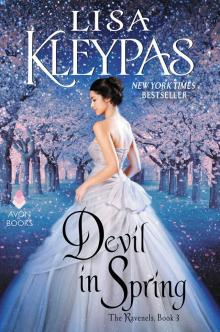 Devil in Spring
Devil in Spring Sugar Daddy
Sugar Daddy Devil in Winter
Devil in Winter Dreaming of You
Dreaming of You Christmas Eve at Friday Harbor
Christmas Eve at Friday Harbor Love, Come to Me
Love, Come to Me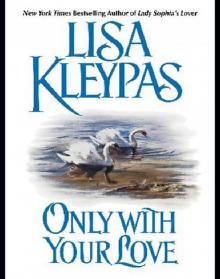 Only With Your Love
Only With Your Love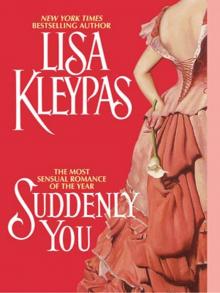 Suddenly You
Suddenly You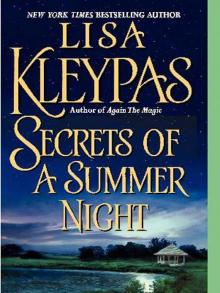 Secrets of a Summer Night
Secrets of a Summer Night Cold-Hearted Rake
Cold-Hearted Rake Where's My Hero?
Where's My Hero? Gifts of Love
Gifts of Love Married by Morning
Married by Morning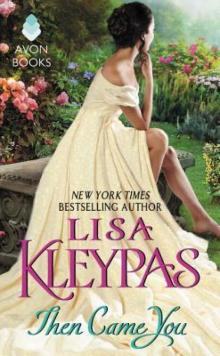 Then Came You
Then Came You Wish List
Wish List Where Dreams Begin
Where Dreams Begin A Historical Christmas Present
A Historical Christmas Present Somewhere I'll Find You
Somewhere I'll Find You Scandal in Spring
Scandal in Spring Someone to Watch Over Me
Someone to Watch Over Me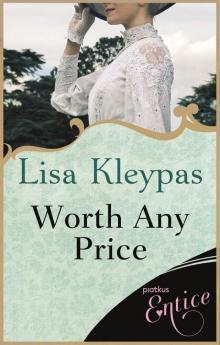 Worth Any Price
Worth Any Price Prince of Dreams
Prince of Dreams It Happened One Autumn
It Happened One Autumn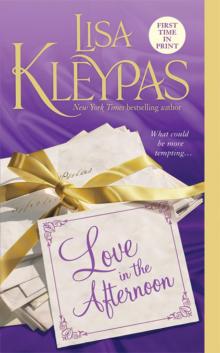 Love in the Afternoon
Love in the Afternoon Devil's Daughter
Devil's Daughter A Wallflower Christmas
A Wallflower Christmas Tempt Me at Twilight
Tempt Me at Twilight Brown-Eyed Girl
Brown-Eyed Girl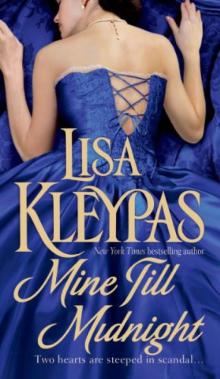 Mine Till Midnight
Mine Till Midnight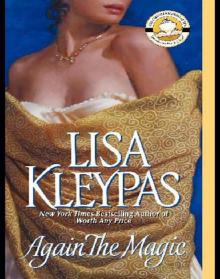 Again the Magic
Again the Magic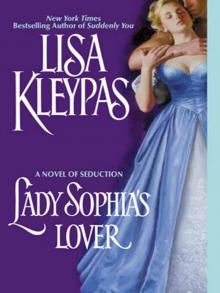 Lady Sophia's Lover
Lady Sophia's Lover Because You're Mine
Because You're Mine Midnight Angel
Midnight Angel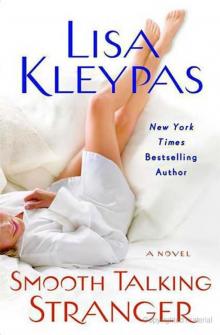 Smooth-Talking Stranger
Smooth-Talking Stranger Blue-Eyed Devil
Blue-Eyed Devil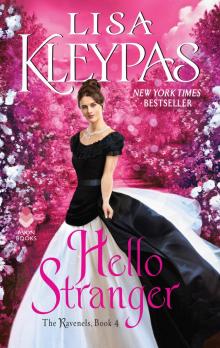 Hello Stranger
Hello Stranger Dream Lake
Dream Lake Devil's Daughter: The Ravenels Meet the Wallflowers
Devil's Daughter: The Ravenels Meet the Wallflowers A Christmas to Remember
A Christmas to Remember Smooth Talking Stranger
Smooth Talking Stranger Crystal Cove
Crystal Cove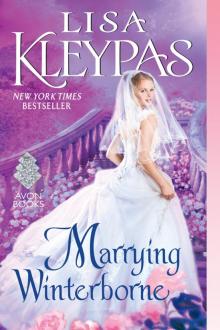 Marrying Winterborne
Marrying Winterborne Stranger in My Arms
Stranger in My Arms Devil in Disguise
Devil in Disguise Worth Any Price bsr-3
Worth Any Price bsr-3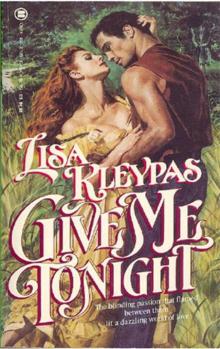 Give Me Tonight
Give Me Tonight Rainshadow Road fh-2
Rainshadow Road fh-2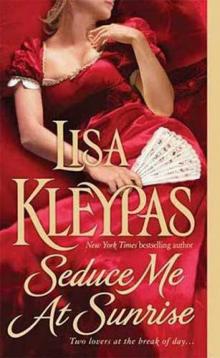 Seduce Me At Sunrise
Seduce Me At Sunrise I Will
I Will Someone to Watch Over Me bsr-1
Someone to Watch Over Me bsr-1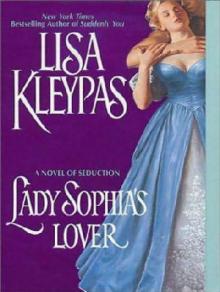 Lady Sophias Lover bsr-2
Lady Sophias Lover bsr-2 A Hathaway Wedding
A Hathaway Wedding A Hathaway Wedding (Hathaways Bk2.5)
A Hathaway Wedding (Hathaways Bk2.5) Worth Any Price - Bow Street 3
Worth Any Price - Bow Street 3 Christmas with Holly
Christmas with Holly